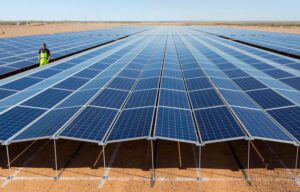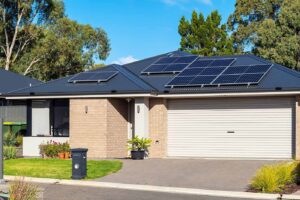There has been justified positive coverage of Labor’s freshly-announced plan to supplant rooftop solar subsidies with very generous discounts of battery storage.
The ‘Cheaper Home Batteries’ program seems like a rare climate policy win that tackles both power grid emissions and cost of living concerns at the same time. Households that obtain the ability to ‘shift’ their daytime solar generation into the expensive morning and evening peaks will shave thousands of dollars off their annual power bills.
From a system perspective, greater clean power generation occurring in those peaks causes a material reduction in demand for extremely expensive evening gas-fired power generation (which has been preying on lulls in wind or solar output to gouge consumers).
The closest thing to criticism of the policy has been from groups focused on housing and economic justice, who call for Labor to go even further and ensure the benefits flow to the millions of Australian who either do not own a home, or living in an apartment block or complex.
Renew Australia For All highlighted the need for more work to ensure “everyone – including renters, apartment dwellers and low income households – are not left behind”, and called for “an immediate $5 billion investment to help those most in need access rooftop solar, batteries, electrification and efficiency improvements so they can take back control of their energy bills now and for good”.
Diana Olmos, Community Organiser Sydney Alliance said “a battery subsidy is a welcome step—but to truly deliver energy justice, it must be accessible to renters, social housing residents, and those in apartments”.
In short: this is a great policy, and if Labor are re-elected, they’d do well to run with this ambitious approach in a way that ensures equity.
In 2021, researcher William Lamb et al published a paper on ‘discourses of climate delay’. One of the categories of climate delay is the ‘false appeal to social justice’: when a critic of climate action pretends to care about fairness, when they attack a policy (I like ‘concern trolling‘, too).

This was on full display when Nationals leader David Littleproud claimed, on the ABC’s Insiders program, that:
“In the short term, not everyone can afford a battery unfortunately. A poor old pensioner out there isn’t going to be able to make up the other $8,000 to be able to pay for that. Someone renting is going to have that. What we need to do is fix the fundamentals and that is flood the market with gas”.
Dutton dropped a similar line: “For $10,000 for a battery, maybe that’s the cost after this subsidy, I think you’re talking about higher income families being in a position to pay for that … I just don’t know that the next-door neighbour, who can’t afford to pay for that battery, is going to subsidise the battery for me or for you on higher incomes”.
Dutton also claimed that the existence of the scheme was an admission that ‘prices will go up’ under a Labor government.
Ah yes, Peter Dutton and David Littleproud, well-known champions of fair, equitable climate policy, right? This is, of course, a textbook fake appeal to social justice as identified in the Discourses of Delay paper.
You can tell because neither of them proposed expanding and improving the policy to be more equitable, like the many good-faith and constructive climate groups did when congratulating Labor on their policy.
Dutton’s claim that prices are set to go up is blatantly contradicted by the Australian Energy Market Commission (AEMC)’s latest ‘price trends’ report, published last November.
That report found that “Residential electricity prices are modeled to fall by about 13% over the next 10 years…most of the reduction is projected to occur in the next few years, driven by an anticipated increase in renewable generation in AEMO’s system plan”.

While the AEMC report doesn’t model household batteries, it generally finds that a slowdown in electrification, renewable energy growth and consumer energy resources (CER) will all threaten to reverse this trend and cause a real increase in household electricity prices from now into the future.
“The effective use of CER can lower system costs for all households by reducing the need for additional network investment to meet peak demand, and reducing the risk of spikes in wholesale prices”.
While Labor’s policy should be to be expanded and improved to ensure the fair flow of clean technology benefits, there is nothing worse you could choose to do for people’s power bills and equity around energy than take the Coalition approach and kill off new energy investment.
The ‘false appeal to social justice’ is bad-faith, cynical concern trolling from a party that spent their first week stumbling on energy and climate policy.







